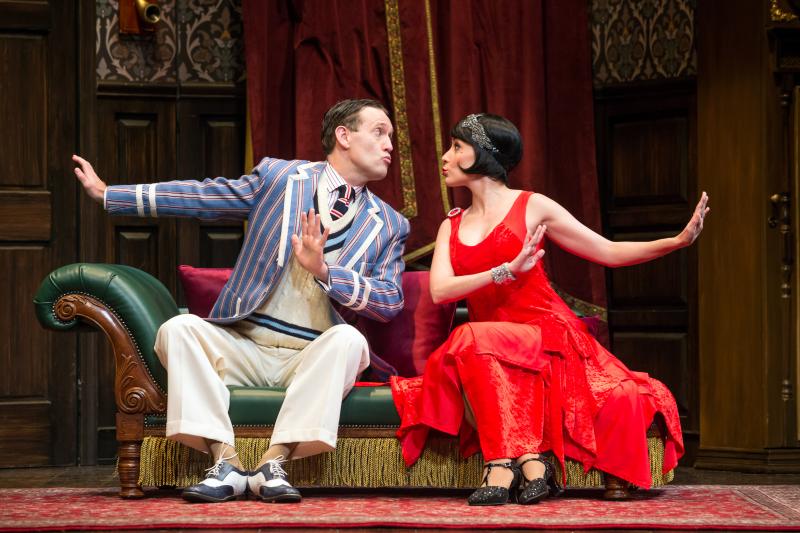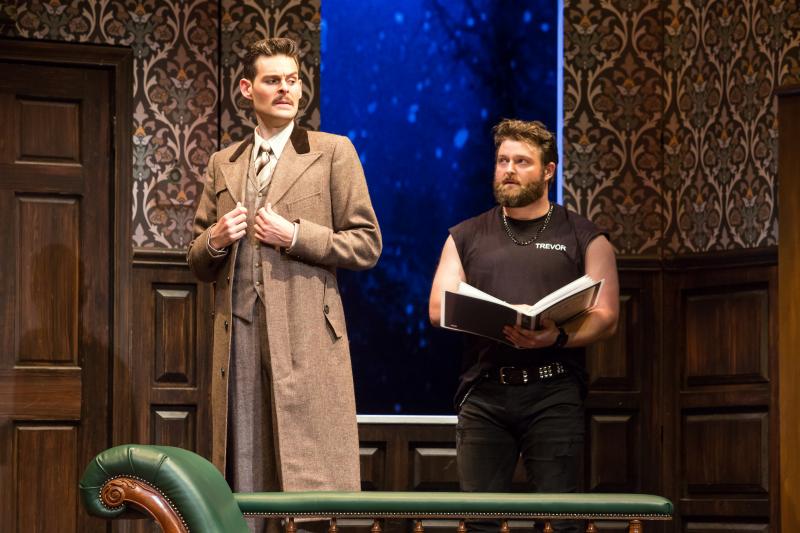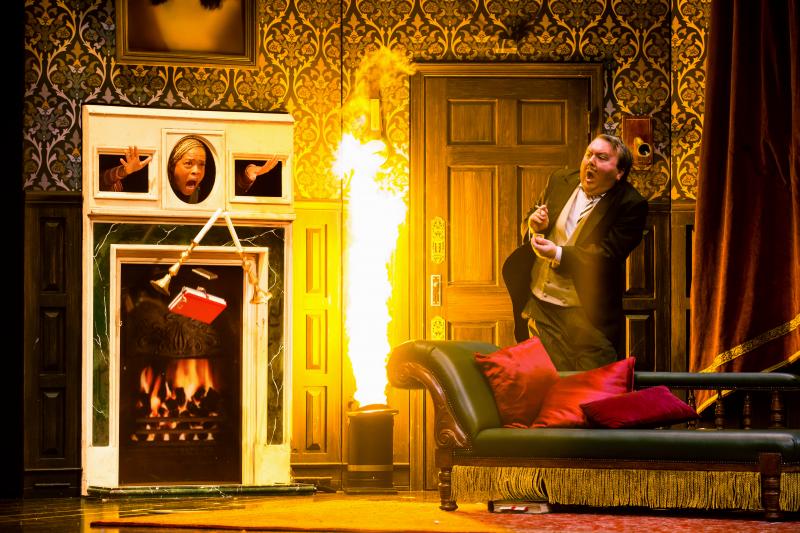Review: THE PLAY THAT GOES WRONG Delivers the Comedy Goods for Nashville Audiences
(1).jpg)
Before launching into a rather lengthy piece about how The Play That Goes Wrong changed my life, gave it a new direction and inspired me to pursue greatness - of both the dramatic and literary variety - I am compelled to offer a few words of warning to those of you who have, at one point or another, found yourselves involved in the process of creating, whether onstage or off, amateur theatricals.
As a serious theater critic for some four decades, give or take a fortnight or two, it's incumbent upon me to warn you to steer clear of The Play That Goes Wrong (the new play now ensconced at the Tennessee Performing Arts Center for an eight-performance run through Sunday, 14 October, in Andrew Jackson Hall) lest it trigger another episode of post-traumatic stress disorder related to your experiences in community theater where, as we all know, anything can go wrong and it almost always does. However rollicking and rambunctious its comedy may be (and, for the love of God, it is uproarious, to be certain!), you will likely leave TPAC in search of the nearest treatment center in which to recover - or, at the very least, the nearest bar at which you'll come a-cropper after imbibing one or four too many tumblers of single-barrel Scotch (or Bourbon, considering we are in the south, after all).
.jpg) Make no mistake about it: Everything that could conceivably trip up seasoned performers - who've been reciting monologues in front of their bathroom mirrors since they were toddlers, bringing down a set considered to be a landmark in design for the stage (or in the history of architecture since the Greeks built their first temple and the Romans engineered their first aqueduct), and/or sending scores of trembling thespians to the emergency room after but one performance - actually befall the cast and crew of The Play That Goes Wrong. In fact, performing a classic British country house "whodunnit" in two-and-one-half-hours while declaiming their hearts out while trying, however valiantly, to remember all the pages of dialogue committed to memory during rehearsals, the poor souls who are members of the Cornley University Drama Society are tested to the very limit of their natures. And, so too, are audience members who spend the same time period laughing heartily, guffawing with abandon and generally responding to all the onstage hijinks with assorted gasps, exhortations of "look under the chaise" and chortles of disbelief at what transpires before them.
Make no mistake about it: Everything that could conceivably trip up seasoned performers - who've been reciting monologues in front of their bathroom mirrors since they were toddlers, bringing down a set considered to be a landmark in design for the stage (or in the history of architecture since the Greeks built their first temple and the Romans engineered their first aqueduct), and/or sending scores of trembling thespians to the emergency room after but one performance - actually befall the cast and crew of The Play That Goes Wrong. In fact, performing a classic British country house "whodunnit" in two-and-one-half-hours while declaiming their hearts out while trying, however valiantly, to remember all the pages of dialogue committed to memory during rehearsals, the poor souls who are members of the Cornley University Drama Society are tested to the very limit of their natures. And, so too, are audience members who spend the same time period laughing heartily, guffawing with abandon and generally responding to all the onstage hijinks with assorted gasps, exhortations of "look under the chaise" and chortles of disbelief at what transpires before them.
Yet, in retrospect, you may also be certain of this: You won't spend two-and-one-half-hours having more fun than you will at a performance of The Play That Goes Wrong, easily the most entertaining comedy to come down the theatrical pipeline since Noises Off and one that may even deliver more giggles to the minute than any other comedy before it. In brief, get yourself tickets for one hilarious theatrical event that is quite unlike anything you've experienced before. Because it is that good and it is that funny, just like the friend of your sister's hairdresser's uncle told you - you know, the guy (or girl, we're anything if not egalitarian) who saw it in New York before it made its way to the provinces for its first national tour.
We must admit that we'd heard so much about The Play That Goes Wrong from friends and total strangers who saw it in New York or even in London, for that matter, that the cast and crew - the real-life actors and technicians with scads of Broadway, touring and regional theater credits on their burgeoning resumes - had a long row to hoe, so to speak, in order that I might leave the theater impressed, if not thoroughly flummoxed and completely enraptured by what I'd just experienced.

In bringing the riotously engaging show to life on the expansive stage of TPAC's Andrew Jackson Hall, they, along with their fictional counterparts who perform the actual play (within the play) - The Murder at Haversham Manor in a "production...made possible by the British-American Cultural Exchange Program" - deliver the goods with so much grace and good timing that it's easy to forget they are acting. They experience all the pratfalls, all the miscues and all the flying props with such practiced ease that it's as if the ensuing hilarity is taking place for the very first time. Actually, it may well be occurring in that particular manner (in that precise moment) for the very first time, since one of the hallmarks of The Play That Goes Wrong is that each performance is unique, given the interaction with the audience and the energy they supply, what with their frequent fits of laughter more often than not accompanied by thunderous applause, throughout the performance. Certainly, it's not improvisation taking place on the stage in front of you - it's far too well-rehearsed and impeccably timed for that - but instead director Matt DiCarlo's (inspired, no doubt, by the original Broadway direction of Mark Bell) crackerjack ensemble of actors are quick on their feet, startlingly adept at their jobs and so committed to what they're doing that it just seems that way.
The travails visited upon the play's cast during the course of The Murder at Haversham Manor and/or The Play That Goes Wrong (since they are inextricably and inexorably linked) are larger than life and perhaps unbelievable, but anyone who has ever engaged in putting on an amateur theatrical, no matter the budget for said production, knows just how close to the truth it all is. After all, highly charged creative types are more apt to become involved in the type of incidents and accidents that happen onstage (any stage) in this particular comedy, written by Henry Lewis, Jonathan Sayer and Henry Shields of The Mischief Theare.

It is, however, the exemplary talents of director Bell's ensemble, and the quick-thinking technicians who ensure performance-after-performance they emerge from the stage door relatively unscathed, that guarantee a theatrical experience perhaps unparalleled in this day and age of theatrical sleight of hand and technical wizardry demanded by 21st century audiences. In a relatively short time (the company launched its national tour less than a month ago), the actors have melded together to create an awesome onstage force who bring the farce to life with

a palpable sense of joyful abandon and laser-like focus.
Led by Evan Alexander Smith - who plays Chris Bean (the director/costume designer/fight choreographer/dramaturg/dialect and voice coach/press rep and PR guy of the play within the play), who in turn plays Inspector Carter, who arrives at Haversham Manor to investigate a supposed murder - the cast is thoroughly committed to giving the people out in the dark that which they paid for: a comedy of heroic proportions that leaves them wanting more. The sustained ovation at final curtain (during which some 1,500 people leapt to their feet for several minutes of uninterrupted applause) on opening night was as heartfelt and impressive as any we've witnessed at TPAC over the years.
As the unctuous head of the touring Drama Society's members, Smith is wonderfully droll and officious and when things begin to go wrong (and boy, do they ever!), he manages to convey the emotions experienced by every director of every show that's ever been done since Thespis stepped out of the chorus (there's a shiny gold star for anyone who can derive from whence that reference comes). The look of sheer terror in his eyes as the play devolves is delicious and only underscores the events taking place.
Surrounding Smith is a top-flight gaggle of consummate actors who never say die (even as the body count onstage continues to mount) and who keep the action moving along at a raucous pace from start (be forewarned that the fun and games begin in the audience well before the stated time of curtain, so don't be late for the party) to finish (those same people who arrived early seemed loath to leave the theater even after the final bows). Peyton Crim is blustery and overblown as the very serious actor Robert Grove, who plays the possibly larcenous Thomas Colleymoore, and he displays a tremendous gift for physical humor while trying to keep things from crashing and, quite literally, burning.
.jpg)
Romero and Ned Noyes
Ned Noyes is great as Max Bennett as Cecil Haversham, making the most of every moment onstage to garner the audience's loudest laughs and applause with an outrageous performance that will remind you of every ham ever to grace the stage. Scott Cote (last seen in Nashville as the puritanical yet flamboyant clergyman in Something Rotten) gives Mrs. Malaprop a run for her money with his inability to properly pronounce any word of more than one syllable and then he is faced with acting while carrying a chaise longue (which no one pronounced correctly, by the way) on his back.
Jamie Ann Romero and Angela Grovey may have taken some cues for their performances from the ladies of GLOW (the Netflix comedy series about a TV wrestling series of the 1980s) to deliver physically challenging performances that are knockouts of precision, timing and unerring skill. Both women know their way around a punch line, a straight line or any other line of dialogue given to them and in short order become audience favorites.
Brandon J. Ellis is excellent as sound technician Trevor, who fails to pay attention to what he's supposed to be doing while searching for a CD box set of Duran Duran hits and who is pressed into the service of the play when others fall to the wayside as once accident after another inflict their toll on the ensemble. Finally, Yaegel T. Welch, as the supposedly dead Charles Haversham, shows off his own notable comedy chops with some genuinely funny moments that will leave real-life directors (both aspiring and otherwise) squirming in their seats.
.jpg)
and Ned Noyes
Nigel Hook's scenic design for The Play That Goes Wrong is ingeniously conceived and amazingly realized. It should be noted that no actors or techies were injured (so far as we could tell) during the performance of the play. Hooks' set and the actors are lit exquisitely by designer Ric Mountjoy's vision for the work, while Roberto Surace's costumes outfit the cast in stage-perfect style.
In conclusion, may we suggest that if you are in need of some escapism, or have a desire to run away from the rigors of the real world and to forget about the tenor of events in this wacky country of ours, there is no better way to cure what ails you than a night (or an afternoon) of The Play That Goes Wrong. You deserve to laugh today.
The Play That Goes Wrong. By Henry Lewis, Jonathan Sayer and Henry Shields. Directed by Matt DiCarlo. Original Broadway direction by Mark Bell. Presented by HCA/TriStar Health Broadway at TPAC. At Andrew Jackson Hall, Tennessee Performing Arts Center, Nashville. Through Sunday, October 14. For details, go to www.TPAC.org or call (615) 782-4040. Running time: 2 hours, 25 minutes (with one 20-minute intermission).
production photos by Jeremy Daniel


